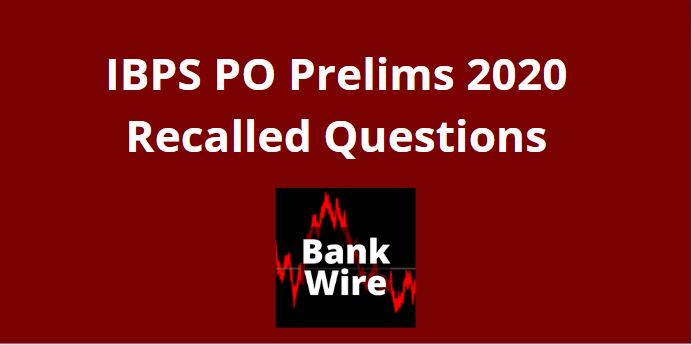
IBPS PO Prelims 2020 Recalled Questions
Check IBPS PO Previous Year Paper, Plan your strategy to score well
To prepare well for IBPS PO Prelims exam, we have tried to recall questions of IBPS PO Prelims 2020
Directions (1-4): In each of the questions given below a sentence is given with three words in bold. Choose the option which gives the correct sequence of these words to make the sentence grammatically and contextually correct.
Q1. The role played by human rights organizations in documenting (A) and questioning state component (B) and excesses is a necessary functioning(C) of civil society activism
(a) BAC
(b) None of these
(c) CAB
(d) BCA
(e) ACB
Q2. The C&AG’s observations in its divisible (A) audit report relate to the denial of States’ financial (B) in the share(C) taxes pool.
(a) CBA
(b) BAC
(c) ACB
(d) None of these
(e) BCA
Q3. Many countries have chosen to ignore the connection between biodiversity and well-being, and pursuit (A) ecological capital in prosperity (B) of financial depleted (C).
(a) None of these
(b) CAB
(c) ABC
(d) BCA
(e) CBA
Q4. Gandhi’s repeated thought (A) on service to all human beings from all traditions of emphasis (B) was the essence (C) of his nonviolent democratic theory.
(a) ABC
(b) ACB
(c) CAB
(d) BAC
(e) None of these
Directions (5-7): Which of the phrase/ word from the options (a), (b), (c) and (d) given below each sentence should replace the phrase printed in bold letters to make the sentence grammatically correct? If the sentence is correct as it is, mark (e) i.e., “No replacement required” as the answer.
Q5. A truck had assumingly collide with a car.
(a) evidently collided
(b) consequently met
(c) virtually received
(d) tremendously mishap
(e) No replacement required
Q6. The politicians makes vague promise about tax cuts.
(a) has promises
(b) would recalled policies
(c) made vague promises
(d) should conflict promise
(e) No replacement required
Q7. Students feel autonomous when they are able to willing engage time and energy to their studies
(a) Readily devoted
(b) full assign
(c) willingly devote
(d) cooperate willingly
(e) None of these
Directions (8-12): In each of the questions given below, a sentence has been divided into FIVE parts. Rearrange the parts of the sentence to make a grammatically correct and contextually meaningful statement.
Q8. (A) a health bulletin released by the Delhi government (B) in the Capital in the past 24 hours taking (C) as many as 3,227 new COVID-19 cases were reported (D) the total number of cases (E) to 2,76,325, according to
(a) EACDB
(b) CBDEA
(c) No rearrangement required
(d) BDCEA
(e) DEABC
Q9. (A) The Delhi High Court allowed (B) the CBI and ED’s appeal (C) former Telecom Minister A. Raja and others (D) for an early hearing on its leave to appeal (E) against the 2G case verdict acquitting
(a) ABDEC
(b) CBDAE
(c) DABEC
(d) BDECA
(e) No rearrangement required
Q10. (A) intensify their agitation from October 1, (B) which will include an indefinite “rail roko” (C) protest and the social boycott of political leaders (D) farmer outfits announced (e) that they would
(a) No rearrangement required
(b) CBDAE
(c) DEABC
(d) BDECA
(e) ACDBE
Q11. (A) Maharashtra Governor issued a notification that (B) will enable tribal and other traditional (C) forest dwelling families to (D) build houses in the (E) neighborhood forest areas.
(a) ACDBE
(b) CBDEA
(c) DAEBC
(d) BEDCA
(e) No rearrangement required
Q12. (A) of the failure of due process (B) the controversies surrounding (C) the reality that the (D) movement itself is a result (E) ‘Me Too’ are complicated by
(a) ACDBE
(b) CBDEA
(c) DAEBC
(d) BECDA
(e) No rearrangement required
Directions (13-20): Read the following passage carefully and answer the questions given below it. Certain words have been printed in bold to help you locate them, while answering some of the questions. (RC was based on education and technology-ibps po pre shift 1 2020)
Although many people like to rely on traditional methods of teaching, the possibilities that open when technology is brought into the classroom are endless. For one, access to education has been significantly broadened as a result, including a wide range of learning styles and degree options. Even if you are not a student or an education professional, it is crucial to note the importance of technology in education. To really utilize these tools, teachers should ask themselves why students want technology in the classroom, not just why they need it. It can definitely help education professionals in the monitoring of individual development and innovative lesson planning; but the students who learn through technology can create a set of skills that will help them throughout their own future careers.
Technology simplifies access to educational resources. Since students already rely on technology in their everyday lives, why not integrate it into the classroom? Children today frequently use their smartphones and tablets outside of school hours, and should be trusted with the responsibility during school as well. Many believe that it actually helps students stay engaged during class by using a familiar tool for academic learning.
By incorporating modern technology like artificial intelligence, for instance, teachers can develop more creative and innovative lesson plans to hold the attention of their classes. Not to mention, as new methods of teaching develop, so does the need for specialized professionals both within and outside of the education field.
Many believe that technology can enhance individual learning, removing educational boundaries that teachers may face. It enables online education, distance learning, and access to up-to-date information. Because each student interprets this information differently, technology can enable more research into subjects that are more difficult to learn. They can learn at their own pace.
Thus, Educational Technology is a systematic approach to the processes and resources of teaching, educational technology, or EdTech, utilizes technology to improve the performance of students.
It identifies the needs of individuals, adapting technology to classroom instruction and in the tracking of student development. It requires teachers to accurately reveal the needs of students in order to determine the relevant technology to apply to the curriculum and to track the results to determine the effectiveness of the measures. Educational technology is a fairly new field in the education sector, and not all teachers are ready to start implementing such technologically-driven plans.
However, the cost of education has significantly reduced, with options like online degrees and by eliminating the need to buy physical textbooks. By accessing scholarly articles from your university’s database, for example, you can easily choose to continue your studies from another country or without leaving your home. Students don’t even need to enroll in a full degree program to learn from the best universities in the world. Typically, free for students, most academic journals will offer full digital versions of books originally produced in print. Even if you are not currently studying or involved in the education community, various articles, videos, etc., can be downloaded right to your phone, making the learning process both easily accessible as well as mobile.
Because of technology, education is becoming more flexible and accessible. We have seen a growing popularity of online degrees and mobile learning, physical boundaries have been removed, and many executives have embraced technology to supplement the further education of their employees.
Q13. Why do students need technology in the classroom?
(I) It helps students prepare for their future careers
(II) Technology helps the students to simultaneously perform many activities.
(III) Technological goods help students stay engaged during class.
(a) Only (i)
(b) Both (i) and (ii)
(c) Both (i) and (iii)
(d) Only (iii)
(e) None of these
Q14. How does technology aid specialized professionals?
(a) Specialized professionals can tap opportunities within and outside education field
(b) teachers can develop more creative and innovative lesson plans
(c) They can conveniently follow the conventional methods
(d) Both (a) and (b) (
e) All (a) (b) and (c)
Q15. How does technology benefit students in their learning?
(a) they gain access to up-to-date information
(b) Students can learn at their own pace
(c) They can further research the subjects that are difficult to learn.
(d) They can access the lessons from any part of the world.
(e) All of these
Q16. What could be the barrier while implementing educational technology?
(a) Teachers could be more hesitant while adapting technologically driven plan
(b) Most of the students cannot afford technological goods
(c) Parents are dubious while selecting technological plans
(d) Technology has several ill effects on the mental and physical health of the students
(e) None of these
Q17. How does technology help to reduce the cost of learning?
(I) Removal of physical textbooks
(II) Removal of transportation charges
(II) Most of the academic journals are free for students
(a) Only (i) (b) Both (i) and (ii)
(c) Both (i) and (iii)
(d) Only (iii)
(e) All of these
Q18. According to the author what could be the inference of the sentence italicized in the given passage?
(a) EdTech is merely to increase the reach to the students.
(b) Specialized professionals can mark their presence outside the education field
(c) Technology aids students to achieve their goals
(d) Technology should be an integral part of learning process
(e) Both (a) and (b)
Q19. Among the given options, choose the word which can replace the highlighted word in the given passage.
FREQUENTLY
(a) repeating
(b) regularly
(c) habit
(d) casually
(e) occasionally
Q20. Among the given options, choose the word with the most similar meaning of the given word.
ELIMINATING
(a) accomplish
(b) adaptive
(c) removal
(d) regulating
(e) introducing
Directions (21-26): Given below is a paragraph that has blank spaces. Corresponding to each blank, five options are given, out of which only one is appropriate. Choose the option that fits most suitably in the given blank making sentence grammatically and contextually correct.
Gaseous refinery __________________(21) include hydrogen, fuel gas, ethane, propane, and butane. Most of the hydrogen is __________________(22) in refinery desulfurization facilities, which remove hydrogen sulfide from the gas stream and then separate that compound into elemental hydrogen and sulfur; small quantities of the hydrogen may be delivered to the refinery fuel system. Refinery fuel gas varies in composition but usually contains a __________________(23) amount of methane; it has a heating value similar to natural gas and is consumed in plant operations. The drawback is that periodic variability in heating value makes it __________________(24) for delivery to consumer gas systems. Ethane may be __________________(25) from the refinery fuel system for use as a petrochemical feedstock. In many cases, these operations take place in relatively remote regions and affect only those employed by the industry, so that little or no __________________(26) is attempted.
Q21. (a) products
(b) services
(c) ideas
(d) form
(e) brand
Q22. (a) enhanced
(b) consumed
(c) manufactured
(d) presented
(e) displayed
Q23. (a) terrible
(b) versatile
(c) importance
(d) significant
(e) majorly
Q24. (a) unsuitable
(b) acceptable
(c) satisfying
(d) appropriate
(e) improperly
Q25. (a) exhausted
(b) worn out
(c) recovered
(d) consumed
(e) depleted
Q26. (a) regulations
(b) policies
(c) authorities
(d) control
(e) incitement
Directions (27-30): There are three sentences given in each question. Find the sentence(s) which is/are grammatically correct and mark your answer choosing the best possible alternative among the five options given below each question. If all the sentences are correct, choose (e) as your answer.
Q27. (i) The recent burglary came as a surprise for the raided home is located in a relatively safe area.
(ii) Furniture makers often use plain woven burlap as a support of the inside of couches and chairs.
(iii) Rescuers were forced to abandon their search.
(a) Only (i)
(b) Only (ii)
(c) Only (iii)
(d) Both (i) and (ii)
(e) All are correct
Q28. (i) His views have excited a lively controversy among fellow scientists.
(ii) Either party have the right to terminate the agreement.
(iii) I am assuming that the present situation is going to continue.
(a) Only (i)
(b) Only (ii)
(c) Only (iii)
(d) Both (i) and (iii)
(e) All are correct
Q29. (i) Praise always stimulates him to make greater efforts.
(ii) The houses were not considered habitable.
(iii) They tried to assure him of their willingness to work.
(a) Only (i)
(b) Only (ii)
(c) Only (iii)
(d) Both (i) and (iii)
(e) All are correct
Q30. (i) The issue of animal experimentation is an emotive subject.
(ii) The King agreed for dissolve the present commission.
(iii) She has endowed with intelligence as well as beauty.
(a) Only (i)
(b) Only (ii)
(c) Only (iii)
(d) Both (i) and (iii)
(e) All are correct
Direction (31 – 35): The Line graph shows the number of people (Boys + girls) visited five (A, B, C, D & E) different parks and the number of girls visited out of total people visited these five parks. Read the data carefully and answer the questions.

Q31. Find total number of boys visited in park A, B & C together?
(a) 104
(b) 102
(c) 106
(d) 108
(e) 96
Q32. If total number of people visited in park F are 18 more than total number of people visited in park C and D together and out of total people visited in park F, th are girls, then find number of boys visited in park F?
(a) 90
(b) 92
(c) 96
(d) 84
(e) 102
Q33. What percent of girls visited in park A with respect to the total number of people (Boys + Girls) visited that park (approximately)?
(a) 41%
(b) 43%
(c) 47%
(d) 49%
(e) 51%
Q34. If park E charge Rs. 24 for each people (Boys + Girls) who visited the park, then find the total revenue get by park E?
(a) 1166 Rs.
(b) 1296 Rs.
(c) 1248 Rs.
(d) 1268 Rs.
(e) 1284 Rs.
Q35. Total people (Boys + Girls) who visited park B is what percent more than total people (Boys + Girls) who visited park E (Approximate)?
(a) 25%
(b) 39%
(c) 43%
(d) 33%
(e) 66%
Direction (36 – 40): What will come in the place of question mark in following number series:
Q36. 9.8, ?, 8.9, 11.6, 8, 12.5
(a) 10.7
(b) 11.7
(c) 10.5
(d) 10.9
(e) 11.3
Q37. 400, 274, 209, 181, 172, ?
(a) 169
(b) 173
(c) 168
(d) 171
(e) 170
Q38. 1, 1, ?, 15, 105, 945
(a) 2
(b) 3
(c) 4
(d) 1.5
(e) 2.5
Q39. 12, ?, 6, 9, 18, 45
(a) 15
(b) 8
(c) 6
(d) 12
(e) 4
Q40. 34, 18, 10, 6, ?, 3
(a) 9
(b) 4
(c) 3
(d) 2
(e) 6
Q41. A man invested a sum at a certain rate of interest on simple interest and he got 60% more amount after eight year. If he invests Rs. 9600 at the same rate of interest on SI, then find the total interest he would get after four years?
(a) 3840 Rs.
(b) 2880 Rs.
(c) 2520 Rs.
(d) 2160 Rs.
(e) 2260 Rs.
Q42. A is 40% more efficient than B and both together can complete a work in 9 days. If A work for first five days alone and remaining work complete by B, then find in how many days total work will be competed?
(a) 20
(b) 16 days
(c) 15
(d) 20 days
(e) 18
Q43. Train ‘A’ running at speed of 54 km/hr crosses a platform of length same as that of the train in 36 sec. If train B, which is 230 meters long crosses the same platform in 25 sec, then find speed of train B (in km/hr)?
(a) 54 km/hr
(b) 72 km/hr
(c) 84 km/hr
(d) 90 km/hr
(e) 108 km/hr
Q44. Four years ago, ratio of age of A and B was Average of present age of A, B and C is 26 years. C is 11 years younger than B. what is the present age of B?
(a) 25 years
(b) 21 years
(c) 22 years
(d) 32 years
(e) 26 years
Q45. A man deposit 10% of his salary in PF. He saves 30% of the remaining. The ratio of his expense on medicine and groceries is 3 :4 of the remaining salary after saving. If his expense on the medicine was Rs 2700. Find the monthly salary.
(a) Rs 10,000
(b) Rs 15,000
(c) Rs 30,000
(d) Rs 20,000
(e) None of these
Q46. In a mixture of milk and water, the proportion of milk by weight is 60%. If from the 80 gm mixture, 20 gm of mixture is taken out and 6 gm of pure water is added to the mixture then find the ratio of milk and water in the new mixture.
(a) 5 : 6
(b) 6 : 5
(c) 4 : 3
(d) 3 : 2
(e) 7 : 6
Q47. A sphere is melted and molded into solid cylinder. If radius of both solids is equal, then find the ratio of total surface area of sphere to the total surface area of cylinder
(a) 2 : 3
(b) 4 : 3
(c) 3 : 7
(d) 6 : 7
(e) 7 : 6
Q48. Three partners P, Q and R invested their amounts in ratio of 2 : 5 : 7. At the end of 6 months, ‘P’ added some more amount such that his investment become equals to half of sum of ‘Q’ and ‘R’ initial investment. If at the end of the year, Q’s share in profit is Rs 425, then find the total profit
(a) Rs 1250
(b) Rs 1360
(c) Rs 1840
(d) Rs 1050
(e) Rs 1450
Q49. A shopkeeper marks up price of LED 60% above its cost price and gives three successive discounts of %, d% and 25%. If shopkeeper made a loss 16% on LED. Find the second discount allowed by shop?
(a) 15%
(b) 20%
(c) 25%
(d) 16 ⅔%
(e) 17.5%
Q50. Speed of a boat in still water is 12 kmph and speed of stream is ‘x’ kmph. If in traveling 270 km upstream boat takes 66 % more time than traveling 270 km downstream, then find the value of ‘x’.
(a) 2 kmph
(b) 4 kmph
(c) 1 kmph
(d) 3 kmph
(e) 6 kmph
Directions (51-55): In the following two equations questions numbered (I) and (II) are given.
You have to solve both equations and Give answer
(a) If x > y
(b) If x ≥ y
(c) If y > x
(d) If y ≥ x
(e) If x = y or no relation can be established
Q51. I. x² – 8x + 15 = 0
II. 2y² – 7y + 5 = 0
Q52. I. 2x² + x – 28 = 0
II. 2y² – 23y + 56 = 0
Q53. I. 2x² – 7x – 60 = 0
II. 3y² + 13y + 4 = 0
Q54. I. x² – 17x – 84 = 0
II. y² + 4y – 117 = 0
Q55. I. x2 = 92
II. (y – 8)2 = 9
Direction (56 – 60): Given below table shows total three types of items (A, B & C) sold by a store on five days of a week. Table also shows total type A items sold by store and percentage of items B and items C sold by store. Read the data carefully and answer following questions:
Note- only three types of items sold by the store.
| Days | Items A | % of items B | % of items C |
| Monday | 240 | 32% | 20% |
| Tuesday | 320 | 48% | 12% |
| Wednesday | 420 | 45% | 20% |
| Thursday | 360 | 56% | 20% |
| Friday | 340 | 22% | 10% |
Total items B sold by store on Monday & Friday together are what percent less than total items C sold by store on Wednesday & Thursday together?
(a) 60%
(b) 50%
(c) 20%
(d) 30%
(e) 10%
Find the difference between average number of items B sold by store on Tuesday & Thursday and average number of items A sold by store on Thursday & Friday?
(a) 260
(b) 264
(c) 262
(d) 272
(e) 268
Q58. If total items B sold by store on Sunday is 25% more than that sold on Thursday and total items C sold on Sunday is 300% more than that sold on Friday, then find total number of items B & items C sold by store on Sunday?
(a) 1250
(b) 1150
(c) 1050
(d) 950
(e) 1350
Q59. Total items C sold by store on Wednesday is what percent more than total items C sold by store on Monday and Tuesday together?
(a) 26 (22/49) %
(b) 24 (22/49) %
(c) 22 (22/49) %
(d) 21 (22/49) %
(e) 18 (22/49) %
Q60. Find the ratio between total items sold by store on Monday to total items sold by store on Thursday?
(a) 1 : 5
(b) 1 : 3
(c) 1 : 7
(d) 1: 4
(e) 1 : 2
Direction (61 – 65): Given data shows total male and female employee in three companies in a seminar. Read data carefully and answer the questions: –
In annual seminar of three companies, A, B and C some male and female employees represent their companies. Average number of female employees who represent A and B is 420. Total male employee in A and B is 1620. Number of female employees is (2/3rd) and (2/5th ) of male employee in A and B respectively. Total female employee who represent C are 25% more than total female employee who represent A and total male employee who represent C are 33(1/3) % more than total female employee who represent B.
Q61. Total employees who represent A is what percent more than total male employee who represent B ?
(a) 33 1/3 %
(b) 30 1/3 %
(c) 27 1/3 %
(d) 29 1/3 %
(e) 39 1/3 %
Q62. 25% of total female employee and 20% of total male employee who represent B & C together have MBA degree, then find total employee who do not have MBA degree?
(a) 1624
(b) 1424
(c) 1824
(d) 1648
(e) 1244
Q63. Find the ratio between total male employee who represent B & C together to total female employee who represent A & C together?
(a) 23 : 13
(b) 23 : 14
(c) 23 : 18
(d) 23 : 12
(e) 23 : 20
Q64. Find difference between Total male employees who represent C and total female employee who represent B?
(a) 120
(b) 140
(c) 100
(d) 160
(e) 180
Q65. Find average number female in B & C ?
(a) 480
(b) 420
(c) 520
(d) 540
(e) 600
Direction (66-100): Study the following information carefully and answer the questions given below:
Twelve students stand in two rows with six students standing in each row. Students in row 1 are facing north direction and students in row 2 are facing south direction. Each student in row 1 faces a student in row 2.
P who stands in row 2 stands second to the right of T. L faces K. Two students stand between K and A who is at one of the extreme ends. G faces the immediate neighbor of V. Only one person stands between V and L. Three students stand between F and W. F faces immediate neighbor of P. K is second to the left of W. W does not face V. R stands to immediate right of S. R and S do not face A. Q stands in same row as K.
Q66. How many students stand between P and S?
(a) None
(b) One
(c) Two
(d) More than three
(e) Three
Q67. If P is related to F, G is related to V then in same manner L is related to _____?
(a) W
(b) Q
(c) A
(d) R
(e) K
Q68. Who among the following faces the one who stand second to the right of S?
(a) The one, who sits third right of F.
(b) The one, who sits immediate left of W.
(c) A
(d) W
(e) The one, who sits immediate right of G.
Q69. Four of the following five are alike in a certain way and hence form a group which of the following does not belong to the group?
(a) S-Q
(b) L-G
(c) A-V
(d) T-G
(e) K-R
Q70. Which of the following is not true regarding Q?
(a) Q stands second to the right of G
(b) Q faces R
(c) Q faces immediate neighbor of T
(d) Two students stand between Q and F
(e) All are true
Direction (71-75): Study the following information carefully and answer the questions given below:
In a certain code language: “work is worship” is coded as “jk rt pq” “work hard always” is coded as “jk mn uv” “always do worship” is coded as “uv st pq” “hard time passes” is coded as “mn ab ef”
Q71. What is the code of “time passes” as per the given code language?
(a) ab uv
(b) ef jk
(c) Cannot be determined
(d) ab ef
(e) ef rt
Q72. What is the code of “worship” as per the given code language?
(a) pq
(b) ab
(c) mn
(d) ef
(e) None of these
Q73. Which among the following words is coded as “rt”?
(a) work
(b) is
(c) hard
(d) time
(e) None of these
Q74. Which among the following words is coded as “ab”?
(a) time
(b) passes
(c) is
(d) Can’t be determined
(e) None of these
Q75. Which of the following words is correctly matched with its code?
(a) work- rt
(b) is- jk
(c) worship-mn
(d) do- rt
(e) hard-mn
Direction (76-80): Study the following information carefully and answer the questions given below:
Seven persons A, B, C, D, E, F and G sits consecutive in vertical row. Each person likes different fruits i.e. Grapes, Litchi, Guava, Orange, Banana, Kiwi and Apple. All the information is not necessarily in the same order.
Two persons sits between B and the one, who likes Litchi. A sits immediate above the one, who likes Litchi. B likes Kiwi. More than four persons sits between G and F, who likes Grapes. F sits at the bottommost position. A likes Guava and sits below G but not immediately below. D, who likes Orange sits below the one, who likes Banana and above C. G does not like Banana.
Q76. Who among the following person likes Apple?
(a) G
(b) C
(c) E
(d) None of these
(e) The one, who sits just below C
Q77. Which among the following statement is true regarding E?
(a) E likes Banana
(b) Two persons sit between E and A
(c) G sits immediately above E
(d) More than three persons sit below E
(e) All are true
Q78. Four of the following five belongs to a group in a certain way, find the one which does not belong to that group?
(a) G-Kiwi
(b) E-Orange
(c) D-Grapes
(d) B-Guava
(e) A-Grapes
Q79. How many persons sit between A and the one, who likes Apple?
(a) Four
(b) Three
(c) Five
(d) Two
(e) None of these
Q80. What is the position of D?
(a) Second from the topmost position
(b) Second from the bottommost position
(c) Fourth from the topmost position
(d) Both (c) and (d)
(e) Third from the bottommost position
Direction (81-84): In each of the questions below are given some statements followed by two conclusions. You have to take the given statements to be true even if they seem to be at variance with commonly known facts. Read all the conclusions and then decide which of the given conclusions logically follows from the given statements disregarding commonly known facts.
Q81. Statements: Some circles are not triangle. Only a few squares are triangle. No rhombus is squares.
Conclusions: I. All rhombus being triangle is a possibility.
II. Some squares can never be circles.
(a) If only conclusion I follows.
(b) If only conclusion II follows.
(c) If either conclusion I or II follows.
(d) If neither conclusion I nor II follows.
(e) If both conclusions I and II follow.
Q82. Statements: Only summer is hot. Only a few summer is rainy. Some winter is rainy.
Conclusions: I. All hot can be winter.
II. Some rainy is not summer.
(a) If only conclusion I follows.
(b) If only conclusion II follows.
(c) If either conclusion I or II follows.
(d) If neither conclusion I nor II follows.
(e) If both conclusions I and II follow.
Q83. Statements: All bus is train. Only a few bikes are train. Some bikes is not car.
Conclusions: I. All bus being car is a possibility.
II. No bus is bikes.
(a) If only conclusion I follows.
(b) If only conclusion II follows.
(c) If either conclusion I or II follows.
(d) If neither conclusion I nor II follows.
(e) If both conclusions I and II follow.
Q84. Statements: No chocolates are biscuits. Only a few biscuits are chips. Some chips are juices.
Conclusions: I. Some biscuits are juices.
II. No biscuits are juices.
(a) If only conclusion I follows.
(b) If only conclusion II follows.
(c) If either conclusion I or II follows.
(d) If neither conclusion I nor II follows.
(e) If both conclusions I and II follow.
Directions (85-89): Study the information carefully and answer the questions given below.
Six persons are going to the six different cities on two different dates i.e. 7th and 16th of three different months i.e. March, April and May of the same year.
B goes in the month which has an odd number of days and on odd number date. Two persons go in between B and the one who goes to Pune. Only two persons go after the one who goes to Varanasi. A goes to Delhi on an odd-numbered date. Only one person goes between A and F. As many people who go before F, as many people go after C. More than two persons go in between D and the E who goes to Indore. F does not go to Chennai. One of the persons visits Jaipur.
Q85. Who among the following goes on 16th March?
(a) The one who goes to Jaipur
(b) A
(c) F
(d) The one who goes to Pune
(e) None of these
Q86. The one who goes on 7th May, goes to which city?
(a) Jaipur
(b) Chennai
(c) Indore
(d) Pune
(e) None of these
Q87. Which of the following statement is not true about E?
(a) B goes just before E
(b) E goes to Pune
(c) Only two persons go between E and F
(d) More than one person goes between E and D
(e) Both (b) and (d)
Q88. Which of the combination is true?
(a) D-7th March
(b) B- Jaipur
(c) C- 16th April
(d) D- Varanasi
(e) None of these
Q89. Who among the following person goes to Varanasi?
(a) D
(b) C
(c) F
(d) B
(e) None of these
Directions (90-92): In these questions, relationships between different elements are shown in the statements. These statements are followed by two conclusions. Give answer
(a) if only conclusion I is true
(b) if only conclusion II is true
(c) if either conclusion I or conclusion II is true
(d) if neither conclusion I nor conclusion II is true
(e) if both conclusions I and II are true
Q90. Statement: D>G≤H=J; J>F≥L; K=L
Conclusions: I. H>F II. K≤G
Q91. Statement: VM; W>P≥X
Conclusions: I. P>Q II. Q≥X
Q92. Statement: W>S=Q; S≤N=O≥Y
Conclusions: I. Q≤N II. W≥O
Q93. How many such pairs of digits are there in the given number ‘73951286’ each of which has as many digits between them in the number as in the Number series (From both backward and forward)?
(a) Two
(b) One
(c) Four
(d) Three
(e) More than four
Q94. If vowels are arranged in alphabetical increasing order from left to right and then consonants are arranged in alphabetical increasing order from left to right in the given word ‘ALONGSIDE’. Then which letter is 4th from the left side in the new word?
(a) A
(b) I
(c) S
(d) O
(e) None of these
Direction (95-99): Study the following information carefully and answer the questions given below:
A certain number of persons sit in a linear row. All of them faces in the north direction. P sits third to the right of S. Only three persons sit between P and Q. U sits third to the left of Q. U sits fifth from the left end of the row. R sits third to the left of U. Only three persons sit between W and T who is an immediate neighbor of R. Only six persons sits to the right of W. M sits immediate left of O. Only three person sits between M and H. O does not sit left of P. H does not sit at the extreme end of the row.
Q95. How many persons sit in the row?
(a) Eleven
(b) Thirteen
(c) Fourteen
(d) Ten
(e) Twelve
Q96. How many persons sit to the left of S?
(a) R
(b) T
(c) H
(d) W
(e) None
Q97. How many persons sit between U and S?
(a) One
(b) Two
(c) None
(d) Three
(e) More than three
Q98. Four of the following five are alike in a certain way and hence form a group which of the following does not belong to the group?
(a) S
(b) U
(c) M
(d) T
(e) W
Q99. Who among the following person sit exactly between R and Q?
(a) T
(b) M
(c) P
(d) H
(e) U
Q100. In a family of three generations there are six family members i.e. P, Q, R, S, T, and U. U is the Son in law of P. Q is the brother in law of S who has no siblings. S is the only child of R. R is married to P. T is niece of Q. How P is related to T?
(a) Maternal Grandfather
(b) Maternal Grandmother
(c) Father
(d) Mother
(e) Cannot be determined
Other Posts:
- IBPS PO Admit Card 2022 For Prelims Exam
- IBPS PO Exam 2022 Tentative dates & Information
- IBPS PO Salary 2022
- IBPS PO Exam Vacancy 2022-23
- IBPS Official Notification
Read Category-wise posts
Banking | Bank Account | Bank Deposit Schemes | Loans | Bank Cards | Credit Cards | Debit Cards | Search IFSC & MCLR Code | Insurance | Bank Jobs and Exams | Stock Market | GST | EMI Calculator




